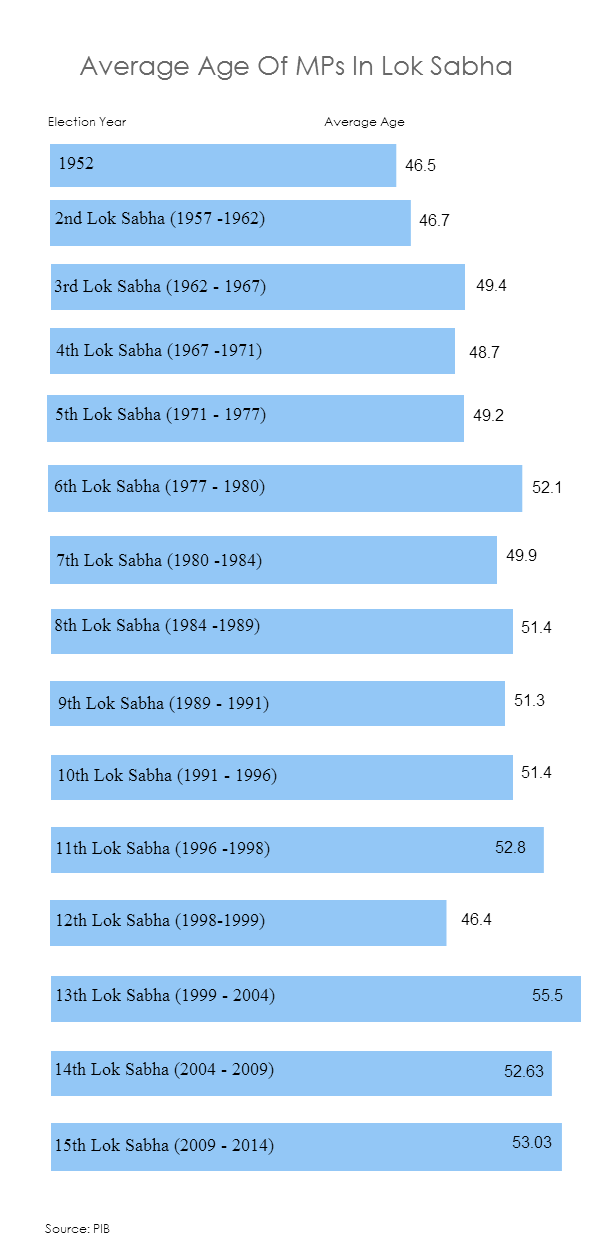Can you guess the average age of an Indian? Well, it is around 27 years. And what about the average age of an Indian MP? Ahem, it currently stands at 52 years for the 17th Lok Sabha.
And this has been the overall trend for quite some time now.

The present government may boast about recording the highest number of women MPs in the Parliament, which is also considerably less. But this average clearly indicates how unrepresentative the cabinet and the Parliament of the country is.
One may wonder the reasons for the same. The answer to the question is rather complicated.
The Overbearing Burden Of Congress
The oldest surviving political party of India, Congress, is a little too long in the tooth. And most of its stalwarts, who had guided India during several crises, are either dead or over the hill.
Therefore whatever they add except for their struggle to keep the party intact adds to the average age of the Indian MPs.
BJP Does Not Do It Any Better
Congress is the largest opposition party for the sake of it. Practically the entire country has flamed up with orange. Presently, the average age of Congress MPs after several ups and downs stands at 57 years.
But it is not any better for BJP, and now that BJP has most of the seats in both houses, BJP MPs’ average age at 55 years is much more concerning.
On Whom Does The Onus Of Change Lie On?
In the 17th Lok Sabha, the Indian Parliament witnessed the swearing-in of hardly 1.5% MPs in the age group of 25-30 years and around 12% in the age group of 30-40 years. On the other hand, India has a whopping proportion of youngsters in its total population.
It is no mystery that young leaders are prerequisites in a country that claims to have the highest number of young people. Therefore, expecting policies that would actually benefit the youngsters or would cater to their needs, from septuagenarian or octogenarian, is as futile as it sounds.
Also Read: Is It Okay For Politicians To Use Unfair Means To Achieve Greater Good? Lord Krishna Says Yes
Is Indian Youth Averse To The Idea Of Politics?
The simple answer to this question is a big NO. We all would agree on the exponential increase in the number of youngsters on roads during election campaigns as they are the ones who do the groundwork for the political parties. Therefore, the active engagement of youth in politics is a reality.

So why does it not translate into new and fresh faces in the Parliament? Well, India has its way which mostly goes through the kernel of corruption, nepotism, and favouritism.
Corruption is one of the weak spots of politics. Injustice and corruption are so internalized now that no honest individual would or could make a respectable living out of politics. Owing to this deficiency, many dedicated youngsters do not seem to opt for politics as their career.
Even if some budding politicians can climb the party ladder of hierarchies, the ingrained nepotism does not allow new talents to the forefront of the battle. Favouritism and political expediency can make the party heads impede the process of transformation if the new candidates do not fulfill their personal agendas and replace them with the older lot.
The Economics Behind Geriatric Leaders
India is still a developing country. That means it cannot afford to remain unemployed for a long time. Therefore, the opportunity cost is sometimes very high. Politics, in itself, is not a very rewarding profession. Either you sacrifice yourself for the country, or the country sacrifices for you.
Under such uncertainty, it becomes extremely difficult for middle-class youngsters to devote their lives to politics. The structural injustices do not allow them to amplify the voices of the needy anytime soon. And they just remain mere puppets in the hands of the top-notch politicians.

Therefore, the young MPs, that you do see, are either well-off and can afford to work for betterment without resorting to dishonest means, or they are in penury and have nothing to lose and, therefore, put their best foot forward.
So, most of the young Indians have to satisfy their political ambitions during the election campaigns, where they get paid daily based on their work.
But the crux of the matter remains that India cannot go far without young leaders. And attempting to correct the structural injustices should be the foremost step towards it. Maybe that’s how we bring the change.
Image Credits: Google Images
Sources: India Today, The Times Of India, The Asian Age
Find The Blogger: @soumyaseema
The post is tagged under: India, Indian youth, geriatric politicians, average age of an MP, aged politicians, corruption, nepotism, favoritism, poor country, underemployment, betterment of people, dedicated work, Congress, BJP, misrepresentation, dynastic politics, injustice, structural problems
Other Recommendations:
Interpol Warns Of COVID-Infected Letters Being Used To Target Politicians Worldwide






























